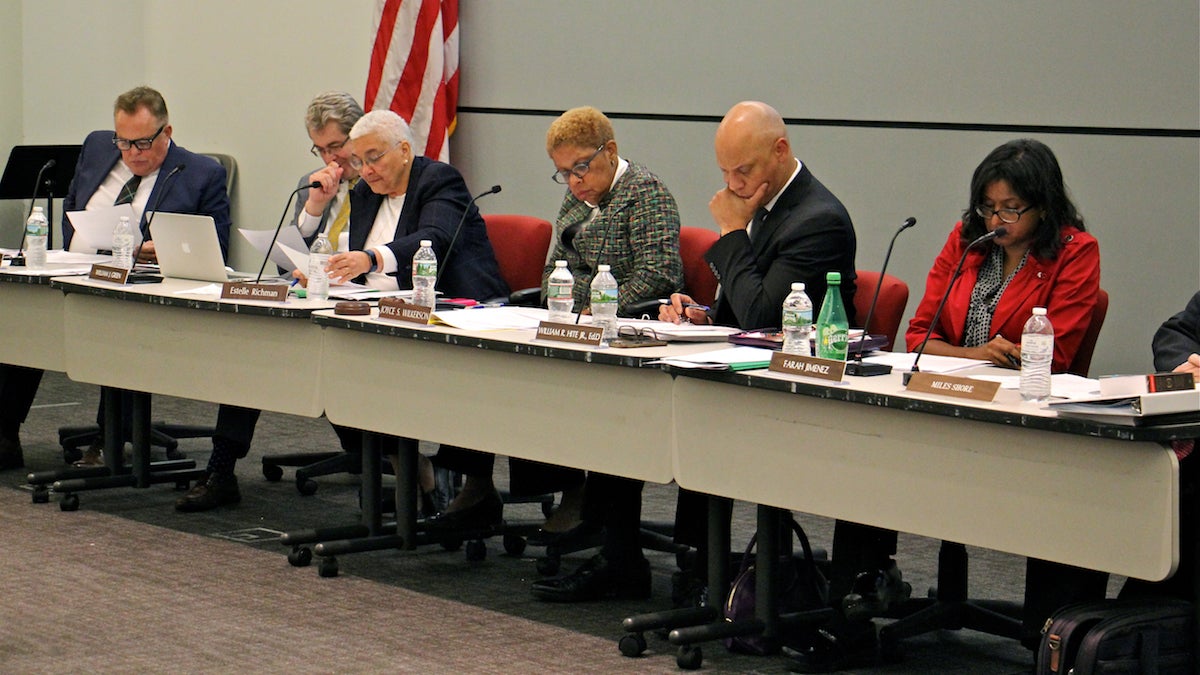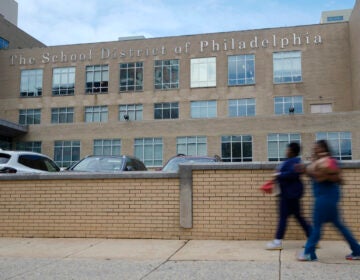SRC delays vote on $36 million contract for special-ed school

Members of the Philadelphia School Reform Commission and Superintendent William Hite meet in May. (Emma Lee/WHYY)
Philadelphia’s School Reform Commission Thursday postponed a vote on a $36 million contract for Catapult Learning, Inc. that would have set up new special-education programming in the city to serve students with multiple disabilities who are now sent to private institutions.
The action came at a contentious, nearly five-hour meeting as speakers repeatedly called on the SRC to disband itself and pave the way for a return of the district to city control.
Superintendent William Hite asked for a delay to revise the motion for the special-education school so it “more clearly reflects the intent of what we created this resolution to do.” He said that one urgent purpose is to move students from a school run by Wordsworth, which lost its operating license for a residential treatment facility last fall when one of its students died after an encounter with staffers. The death was ruled a homicide.
That program had housed between 75 and 100 Philadelphia students, who were moved elsewhere — including to a day program run by Wordsworth in Fort Washington — due to a lack of space.
“Wordsworth is a school where we have children, and we have to get children out of that school,” Hite said. “We are trying to develop a program to move those children to a more supporting educational program.”
The district’s contract with Wordsworth expires June 30.
There is an acute shortage of appropriate programs in the area to meet the needs of hundreds of city students with multiple disabilities, Hite said later.
“There are a significant number of children who should be in those placements who cannot get in,” he said. “They’re on a waitlist … quite frankly, there are no providers that will currently take those children.”
The SRC was planning to award the $36 million contract to Catapult Learning, Inc. to design and staff a school in the city and under the Philadelphia Intermediate Unit. It scheduled a meeting Tuesday at 2 p.m. to vote on the revised resolution, in its capacity as the board of the unit, in an effort to get the program up and running by September. It would start with 200 students and could grow to 600 by 2022, at a cost of $52 million.
Timing questioned
Special-education advocates protested that they had little notice of the plans; that parents would not have time to make informed decisions about their child’s placement; and that the school would “segregate” students with special needs when the preferred option is to include them as much as possible in settings with their classmates.
City Council also unanimously passed a resolution several hours earlier urging rejection, led by Councilman Derek Green, who has a special-needs son in the district. Several of the more than 50 speakers at Thursday’s meeting also decried the action as ill advised
Hite came two hours late to the marathon meeting, but his request for a delay was announced at the beginning by SRC chair Joyce Wilkerson.
“We’re not trying to segregate students, but to work with a new partner to serve students,” Hite said.
He acknowledged that the resolution, as written, was misleading in that it suggested there would be a separate building when “the intent was to have options for children whose [individualized education plan] calls for that type of program.”
More than a hundred students who need the intensive services the proposed school would provide are on wait lists right now, said Hite.
Attorney Lee Awbrey of the Public Interest Law Center said delaying the vote “provides an opportunity to build truly inclusive special-education programs” in the city, but added that many questions remain.
A letter sent Wednesday to the SRC by a coalition of disability advocates, including Awbrey, called the plan “a huge step backwards from hard-fought gains to end discrimination against the isolation of students with disabilities.”
Keeping these students in Philadelphia will provide more chances for them to participate in programs with classmates, including career and technical education and sports, said Cheryl Logan, chief of academic support.
Logan acknowledged that perhaps district officials should have communicated more with parents and advocates before asking the SRC to vote.
“Bringing them under the tent is a good idea for all of us,” she said.
Votes to close charters
The SRC also voted on a raft of charter resolutions, siding with recommendations from the district’s charter schools office in each case.
Commissioners decided unanimously not to renew the charter of Eastern University Academy Charter School and to revoke the charter of Khepera Charter School, actions that could eventually shutter both schools.
It’s rare for the district to revoke a school’s charter before its contractual, five-year term expires, but officials said acute financial and academic shortcomings at Khepera obligated them to act. Khepera has fallen behind on its rent; failed to make mandatory pension payments; allowed its employee health insurance to lapse; and declined to pay staff, according to a district review.
Thursday’s vote opens the revocation process for the 450-student, K-8 school in North Philadelphia. Next up is a public hearing followed by a 30-day public comment period and a second SRC vote on revocation. If the SRC votes to revoke Khepera’s charter, the school could appeal to a state board and, eventually, to the state courts.
No representatives from Khepera commented publicly at the SRC meeting Thursday.
Eastern University Academy Charter School did, however, bring supporters to dispute the charter school office’s characterization of their school.
The office cited academic and organizational concerns in its recommendation against renewing the charter. At the grades seven-through-12 school in East Falls, no middle-school students had proficient or advanced scores on the state math tests and only 23 percent met that bar on state English tests. In the high school grades, Eastern University Academy also received low marks for proficiency, but did show growth in recent years.
The charter office report also identified persistently low attendance rates and organizational problems. For instance, in a review of 20 personnel files, office monitors found four employees without child-abuse clearances, five without state background checks, and 15 without FBI background checks.
Omar Barlow, CEO and principal at Eastern University Academy, blamed poor middle-school test scores on the subpar education he said many of the school’s students receive before enrolling as seventh-graders. Students get stronger as they progress, Barlow said. He pointed to the school’s 79 percent graduation rate as proof, noting that it was higher than those of surrounding neighborhood high schools run by the district.
“If our school were to close, where would they go,” Barlow asked the SRC in a fiery speech.
Eastern University Academy can appeal the SRC’s decision to a state charter board, and has already indicated it will do so.
“The EUACS board intends to appeal any decision of non-renewal, and the school will remain open for the duration of the appeal, a process, which in Philadelphia, sometimes takes several years,” Barlow said in an e-mailed statement.
Decisions on expansion plans
The SRC also voted on six charter school expansion proposals, denying five and approving one. Mathematics, Science and Technology Community Charter School in Northeast Philadelphia received the lone expansion approval. The school, which officials say has a lengthy wait list, can now add 150 seats over the next five school years. The expansion amendment passed 3-2, with Commissioners Christopher McGinley and Estelle Richman voting against.
The SRC also approved new, five-year charters — with conditions — for Philadelphia Electrical and Technology Charter High School in Center City and West Philadelphia Achievement Charter School.
In a surprise, the SRC rejected a $150,000 contract with Cambridge Education to do school-quality reviews. Commissioner Bill Green was the only vote in favor.
McGinley and Richman also voted against resolutions involving teacher recruitment and principal professional development. The recruitment resolution was for Relay College of Education, a program to train teachers started by charter schools. They also opposed a contract to hire some teachers from Teach for America.
WHYY is your source for fact-based, in-depth journalism and information. As a nonprofit organization, we rely on financial support from readers like you. Please give today.





